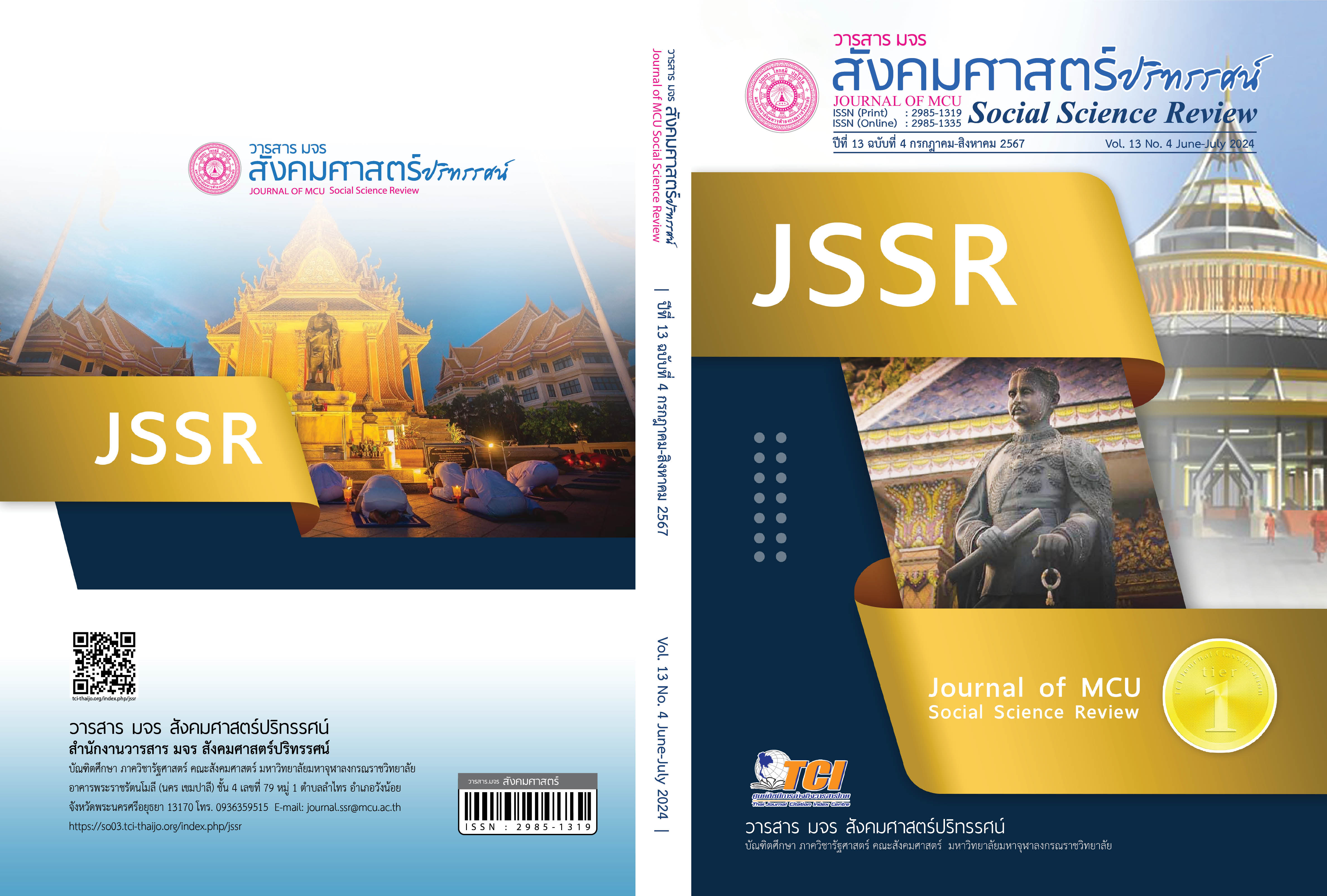การจัดกิจกรรมทางคณิตศาสตร์ ที่เชื่อมโยงกับชีวิตจริงเพื่อพัฒนามโนทัศน์ เรื่องการตวง ของนักเรียนชั้นประถมศึกษาปีที่ 3
คำสำคัญ:
กิจกรรมการเรียนรู้, มโนทัศน์ทางคณิตศาสตร์, การตวงบทคัดย่อ
การวิจัยเชิงปฏิบัติการนี้ เป็นงานวิจัยเชิงคุณภาพมีวัตถุประสงค์เพื่อศึกษาแนวทางการจัดกิจกรรมที่เชื่อมโยงชีวิตจริง และเพื่อศึกษาการเปลี่ยนแปลงมโนทัศน์ทางคณิตศาสตร์เรื่องการตวง ของนักเรียนชั้นประถมศึกษาปีที่ 3 จำนวน 23 คน ใช้รูปแบบการวิจัยเชิงปฏิบัติการในชั้นเรียน 4 ขั้นตอน ได้แก่ ขั้นวางแผน ขั้นปฏิบัติ ขั้นสังเกตและขั้นสะท้อนผล รวม 3 วงจรปฏิบัติการ เครื่องมือที่ใช้ ได้แก่ แผนการจัดกิจกรรมการเรียนรู้ แบบสะท้อนผลการจัดการเรียนรู้ ใบกิจกรรม แบบทดสอบและแบบสัมภาษณ์วัดมโนทัศน์ การวิเคราะห์ข้อมูลใช้การวิเคราะห์เชิงเนื้อหาและการตรวจสอบความน่าเชื่อถือข้อมูลแบบสามเส้า
ผลการวิจัยพบว่า การจัดกิจกรรมทางคณิตศาสตร์ที่เชื่อมโยงกับชีวิตจริง มีขั้นตอนดังนี้ ขั้นที่ 1 การเชื่อมโยงสถานการณ์ในชีวิตจริงกับโลกคณิตศาสตร์ ควรเลือกใช้สถานการณ์ให้อยู่ในความสนใจเพื่อดึงดูดความสนใจของนักเรียน ขั้นที่ 2 การออกแบบแนวคิดเชิงคณิตศาสตร์ ควรเตรียมสถานการณ์ให้นักเรียนทั้งชั้นเรียนได้ลองออกแบบแนวคิดร่วมกันเพื่อเป็นแนวทางในการดำเนินกิจกรรม ใช้ภาษาที่เข้าใจง่ายและไม่ซับซ้อน ขั้นที่ 3 การพัฒนาแนวคิดทางคณิตศาสตร์ให้เป็นทางการ ควรใช้คำถามเป็นกรอบแนวทางการนำเสนอให้กับนักเรียน และกระตุ้นให้นักเรียนคิดและเปรียบเทียบความเข้าใจมโนทัศน์ของกลุ่มตนเองกับกลุ่มเพื่อน ขั้นที่ 4 การสะท้อนคิดสู่ชีวิตจริง ควรเน้นให้นักเรียนทุกคนเข้ามามีส่วนร่วมในการแสดงความคิดเห็นและสะท้อนคิดร่วมกันหน้าชั้นเรียน การจัดการเรียนรู้ที่กล่าวมานี้ ช่วยให้นักเรียนสามารถแก้ไขความคลาดเคลื่อนของมโนทัศน์ที่เกิดขึ้นทั้งด้านทักษะกระบวนการและความสัมพันธ์ของหน่วยลิตรกับมิลลิลิตรได้
เอกสารอ้างอิง
ชานนท์ จันทรา. (2550). การจัดการเรียนการสอนคณิตศาสตร์ที่สอดคล้องกับชีวิตจริงของผู้เรียนจากแนวคิดสู่หลักการ ตอนที่ 2. นิตยสารคณิตศาสตร์ MY MATHS, 3(7), 48-51.
ชำนาญ โพธิ์คลัง. (2547). การพัฒนาคุณภาพการศึกษาโดยใช้กิจกรรมเพื่อนคู่คิดในโรงเรียน สุวรรณภูมิพิทยไพศาล จังหวัดร้อยเอ็ด. สุรินทร์: มหาวิทยาลัยราชภัฏสุรินทร์.
ณัฐริกา ฉายสถิตย์. (2555). การเปลี่ยนแปลงมนมติทางวิทยาศาสตร์และความเชื่อเกี่ยวกับแรงจูงใจ เรื่อง การแบ่งเชลล์ของนักเรียนชั้นมัธยมศึกษาปีที่ 4 เมื่อใช้ยุทธศาสตร์การสอนเพื่อเปลี่ยนแปลงมโนมติ. ขอนแก่น: มหาวิทยาลัยขอนแก่น.
ทองระย้า นัยชิต. (2541). การจัดกิจกรรมการเรียนการสอนคณิตศาสตร์ด้วยเกม.วารสารวิชาการ, 1(5), 62-65.
สถาบันส่งเสริมการสอนวิทยาศาสตร์และเทคโนโลยี. (2550). ทักษะ/กระบวนการทางคณิตศาสตร์. กรุงเทพฯ: โรงพิมพ์คุรุสภาลาดพร้าว.
เสน่ห์ หมายจากกลาง. (2554). ความรู้เชิงมโนทัศน์: จุดเน้นของการสอนคณิตศาสตร์. MY MATHS, 7(70), 54-59.
อนิศา เนตรเกื้อกูล. (2561). การพัฒนาชุดการเรียนรู้เรื่อง โจทย์ปัญหาการชั่ง ตวง วัด โดยใช้สื่อประสมและข้อมูลท้องถิ่น ดอนยายหอม ร่วมกับเทคนิค KWDL สำหรับนักเรียนชั้นประถมศึกษาปีที่ 3. กรุงเทพฯ: มหาวิทยาลัยศิลปากร.
Kemmis, S. et al. (2014). Changing Practices, Changing Education. Singapore: Springer.
Mungsing, W. (1993). Students' alternative conceptions about genetics and the use of teaching straegies for conceptual change Wancharee Mungsing (Master thesis). U.S.A.: University of Alberta.
Wiliams, D. (2007). The What, Why, and How of Contextual Teaching in a Mathematics Classroom. Mathematics Teacher Learning and Teaching PK-12, 100(8), 572-575.
ดาวน์โหลด
เผยแพร่แล้ว
รูปแบบการอ้างอิง
ฉบับ
ประเภทบทความ
สัญญาอนุญาต
ลิขสิทธิ์ (c) 2024 วารสาร มจร สังคมศาสตร์ปริทรรศน์

อนุญาตภายใต้เงื่อนไข Creative Commons Attribution-NonCommercial-NoDerivatives 4.0 International License.
เพื่อให้เป็นไปตามกฎหมายลิขสิทธิ์ ผู้นิพนธ์ทุกท่านต้องลงลายมือชื่อในแบบฟอร์มใบมอบลิขสิทธิ์บทความให้แก่วารสารฯ พร้อมกับบทความต้นฉบับที่ได้แก้ไขครั้งสุดท้าย นอกจากนี้ ผู้นิพนธ์ทุกท่านต้องยืนยันว่าบทความต้นฉบับที่ส่งมาตีพิมพ์นั้น ได้ส่งมาตีพิมพ์เฉพาะในวารสาร มจร สังคมศาสตร์ปริทรรศน์ เพียงแห่งเดียวเท่านั้น หากมีการใช้ภาพหรือตารางหรือเนื้อหาอื่นๆ ของผู้นิพนธ์อื่นที่ปรากฏในสิ่งตีพิมพ์อื่นมาแล้ว ผู้นิพนธ์ต้องขออนุญาตเจ้าของลิขสิทธิ์ก่อน พร้อมทั้งแสดงหนังสือที่ได้รับการยินยอมต่อบรรณาธิการ ก่อนที่บทความจะได้รับการตีพิมพ์ หากไม่เป็นไปตามข้อกำหนดเบื้องต้น ทางวารสารจะถอดบทความของท่านออกโดยไม่มีข้อยกเว้นใดๆ ทั้งสิ้น





